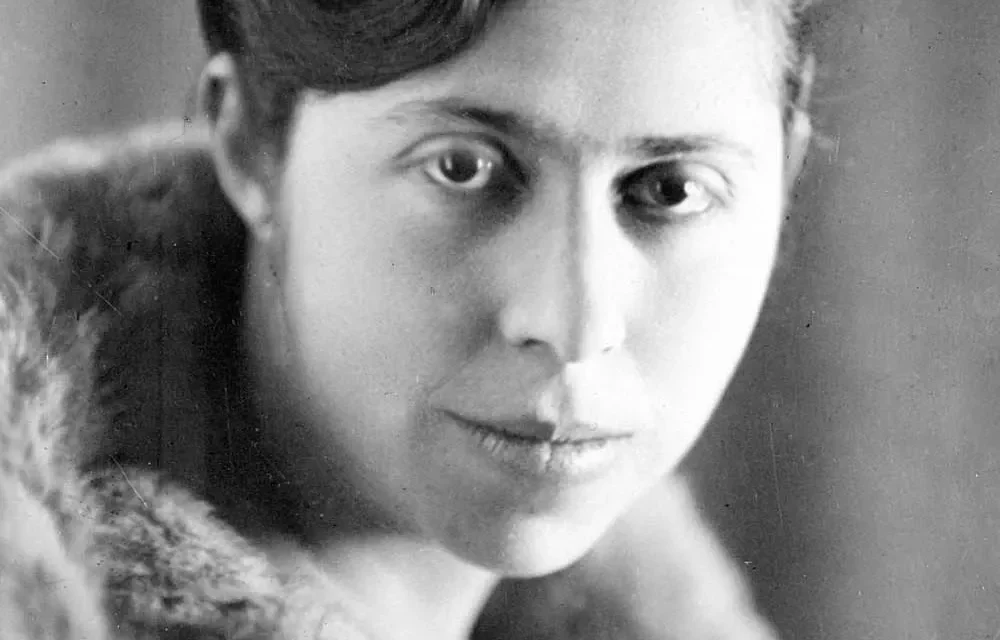A Book Review:
Irene Nemirovsky: Her Life and Works
Jonathan Weiss
Stanford University Press, 2006
If you have read Suite Française — written in the early 1940s but not published until 2004 — with its powerful description of Parisians fleeing the German invasion like horses from a burning building, you might be curious about the woman who wrote it. Born in Russia in 1903, Irène Némirovsky emigrated to Paris during the Russian revolution with her family in 1919.
Némirovsky published prodigiously during the late 1920s and ’30s. Arrested by the French police on July 13, 1942, she was sent to Auschwitz where she died in the gas chamber, age 39, leaving her masterpiece, Suite Française, the first two parts of a projected five-part work incomplete. Its publication in 2004 in France caused a sensation, winning the 2004 Prix Renaudot for 2004, never before awarded posthumously.
The English translation by Sandra Smith received rave reviews across the board and was quickly optioned by Universal for a film to be released this year, starring Michelle Williams, Kristin Scott Thomas, Lambert Wilson and Margot Robbie.
Unlike Anne Frank or Etty Hillesum, Némirovsky left no diaries, but Jonathan Weiss, professor of French at Colby College, does a masterful job of bringing this brilliant and complicated woman to life.
By birth, Némirovsky was Jewish. But growing up on the outer edges of the upper class Christian community in Kiev, her wealthy, non-practicing Jewish family had little contact with the poor, observant Jews in the dark regions of the segregated city. Their great wealth gave them the ability to orbit the bright Russian social world they longed to be part of. But while it made them “acceptable Jews,” they were still Jews and never really secure.
Némirovsky’s father’s business and her mother’s unfaithfulness were at the core of her family life. Her father was a successful banker, who had to start his business over in Paris once his family fled Russia in 1917, was often away from home on business. Her mother enjoyed the money but loved neither her husband nor her daughter, preferring the furs, jewelry, and attentions of her various gigolos.
Némirovsky rejected what she saw as the Jewish obsession with making money. In her first novel David Golder (1929), written at age 26, she presented a harsh portrait of a calculating, greedy Jew who loved money above all things. This debut catapulted Némirovsky to literary recognition but, most disturbingly, made her the darling of anti-Semitic literary circles. What could be more interesting than a Jewess who shared their own misgivings about Jews?
These friendships, some of which lasted until her deportation to Auschwitz, may have lulled her into a false sense of security after the Nazis occupied France. That hope was misplaced, as none of her admirers would come to her rescue after her arrest.
By birth, Irène Némirovsky was also Russian. Instead, she attempted to reconstruct herself as a Frenchwoman. As a young girl she had adopted French language and culture so completely that her family’s flight to France felt more like a homecoming than an uprooting. She idolized the stability, dignity, and order of French society.
In the end, however, France would betray her, a stateless Jew who was not truly French after all. The Nemirovskys were denied French citizenship in 1938. This betrayal is sharply highlighted in Suite Francaise, as the French, clutching their luxuries, trampled each other on their way to survival. When she was arrested on July 13, 1942, she told her two daughters, “I am going on a journey now.” She died of typhus shortly after arriving at the prison camp, where her husband Michael would eventually be gassed four months later.
The two surviving daughters, Denise and Elizabeth, never read through the papers their mother left behind, perhaps finding it too painful to revisit her work. But 50 years later the eldest daughter, Denise, took a look before donating the papers to an archive and discovered the Suite Française.
Finally, there is the enigma of her conversion to Catholicism. On February 2, 1939, Irène Némirovsky, along with her husband, Michael, and the two daughters, was baptized in the chapel of the Abbey Sainte-Marie de Paris. Some saw this as a desperate attempt to escape Nazi persecution. Both her biographer, Jonathan Weiss, and her translator, Sandra Smith, defend the sincerity of her conversion, insisting it has nothing to do with Jewish self-hatred. In fact, however, she kept her conversion fairly private and never, even when danger came to her door, denied or tried to hide that she was Jewish.
Her later novels, such as Jezebel (1937) and All of Our Worldly Goods (1947), and reveal a new turn of mind in secondary characters who radiate Christian virtues like self-abnegation and self-sacrifice. She also began to integrate her Jewish heritage into her new-found faith, as Catholicism had deep roots in the Old Testament faith of her people.
Also, her portrayal of Jews changed. She realized the “wandering Jew” had a meaning and a history. Banned from true integration anywhere they lived, with the money lender’s path the only one open to them, it is not surprising that Jews saw money as their security. It was transportable. When the pogroms came, as they finally did, those with money felt what turned out to be false security.
We can never know how Némirovsky would have incorporated all the contradictory strands of her life and heritage had she peacefully lived out her days writing in Paris, but we can hope that her personal journey found its true fulfillment in her new-found Christian faith. In addition to her fiction, much of which is now translated, Némirovsky’s life itself is a story certainly worth reading.














A very informative introduction to an author whose conversion I was unfamiliar with, and the story of her daughter’s discovery of her novel makes me very interested in reading it. Like many, I need to be more familiar with writers beyond the usual American and English literature , and the bestseller list. The Christian Review is helping me to make wise choices in doing just that. Thank you.